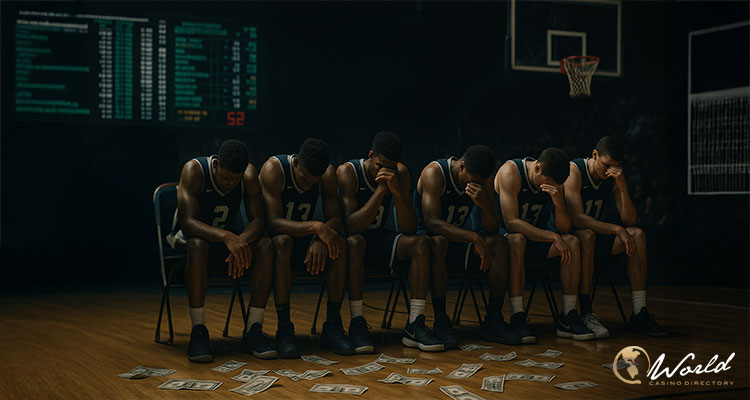The NCAA has permanently revoked the eligibility of six former men’s college basketball players after concluding investigations into three distinct sports-betting schemes tied to the 2024-25 season. According to the Committee on Infractions, the infringements centered on game manipulation and sharing inside information with bettors.
The decisions cover three separate cases — at the University of New Orleans, Mississippi Valley State University, and Arizona State University — that were unrelated to each other but each involved athletes either altering their performances in games to advantage bettors or providing information enabling third-party wagering.
New Orleans: Manipulating Outcomes and Betraying Integrity
At the University of New Orleans, players Cedquavious Hunter, Dyquavian Short, and Jamond Vincent were implicated after a tip to the NCAA enforcement staff. One student-athlete reported overhearing the trio discussing a third party placing a wager for them on their December 28, 2024 game. During a timeout late in that game, the same student-athlete alleged that Short instructed him not to score any further points. The Privateers lost that game 86-61.
Investigators found text messages on Vincent’s phone showing he instructed third parties to bet on that December 28 matchup with the knowledge that he and his teammates planned to “throw the game.” Short and Hunter were also in exchanges discussing receiving $5,000 and participated in a FaceTime call with a known bettor who told them to “lay it down” in the next contest.
Over the course of seven games between December and January, the investigation concluded that Hunter, Short, and Vincent manipulated their performances in an effort to lose by more points than the betting spread.
University President Kathy Johnson stated: “The University of New Orleans holds itself to the highest standards of integrity, character, and sportsmanship and we appreciate the NCAA’s thorough process and remain fully committed to compliance with all NCAA and conference rules.” She added that the institution would continue working with the NCAA and conference partners to ensure all student-athletes understand and uphold participation expectations.
Mississippi Valley State: Betting Patterns Trigger Probe
In the case of Mississippi Valley State, the NCAA enforcement staff, in collaboration with an integrity monitoring service, flagged suspicious betting trends surrounding the Jan. 6 game against Alabama A&M, a 79-67 loss for MVSU.
According to the report, a men’s basketball student-athlete said that ahead of the Dec. 21, 2024 game, teammate Donovan Sanders was heard on the phone with an unknown third party discussing “throwing the game.” Sanders asked the student-athlete to join the call because the bettor wanted to know whether another teammate would participate. The student-athlete denied any receipt of money or altered performance. After the game, Sanders allegedly texted him instructing deletion of their messages.
In a subsequent interview, Sanders admitted that he and Alvin Stredic were offered money by a third-party caller to intentionally perform poorly in the first half of the Jan. 6 game. The enforcement staff found that Sanders knowingly provided information to a third party for sports betting in two games, and Stredic did so for one game.
Both players later left the university. The statement from the school read: “The university takes these matters seriously and uses them as an opportunity to reinforce with all student-athletes the importance of adhering to NCAA regulations regarding sports wagering, which are in place to protect the integrity of collegiate sports and the well-being of student-athletes.”
Arizona State: Fantasy Bets and Sharing Inside Info
At Arizona State University, forward Chatton “BJ” Freeman became involved when investigators reviewing another case found records on former player Mykell Robinson’s phone indicating that Freeman had provided him with information on four occasions between November and December 2024. Robinson was betting on Freeman via daily-fantasy sports accounts.
Freeman also knowingly shared information at least twice with his then-girlfriend, who was also betting on his performance. When interviewed, Freeman denied having shared information or holding a daily-fantasy sports account—despite evidence that he had deposited into an account under his name and email while at a previous school.
Broader Context: Betting Risks Loom Large
These three rulings arrive amid escalating concern about sports betting’s influence in collegiate athletics. The NCAA noted last month that it was investigating at least 30 current or former players for gambling-related infringements.
On the betting front, nearly three dozen individuals—including an NBA player and a coach—were arrested in the previous month, according to a federal probe. Meanwhile, UFC President and CEO Dana White revealed he had contacted the FBI over a match that experienced irregular betting patterns.
Further intensifying the situation, the NCAA had been preparing to permit student-athletes and athletic department staff to place bets on professional sports. Initially set to take effect Nov. 1, the change was delayed to Nov. 22 by the Division I Board of Directors. Even then, athletes are still prohibited from wagering on college sports. A rarely-used rule allows each Division I school 30 days to vote to rescind the change if the proposal passed with less than 75 percent of the Division I cabinet.
What the Sanctions Mean
The Committee on Infractions gave its approval that the violations occurred, but it does not itself issue penalties to student-athletes. The outcome of permanent ineligibility arises from the NCAA’s ethical-conduct rules; individuals who bet on their own games or share inside information typically begin with a baseline of permanent loss of eligibility.
In these three cases, the players no longer attend their former schools. Hunter, Short, Vincent, Sanders, Stredic, and Freeman are all ineligible moving forward. The decisions send a strong message about the NCAA’s stance on betting-related manipulation and the zero-tolerance approach toward acts that threaten competitive integrity.
In conclusion, the NCAA has acted decisively across three separate schools, permanently banning six men’s basketball players involved in schemes to manipulate game outcomes or supply bettors with inside information. These decisions underscore the broader tensions between college athletics and the growing footprint of sports gambling.



